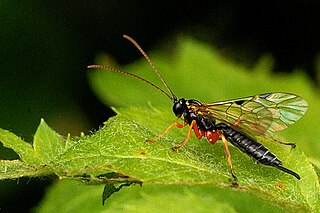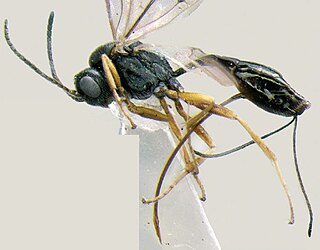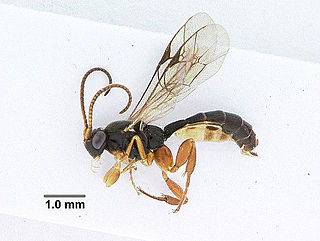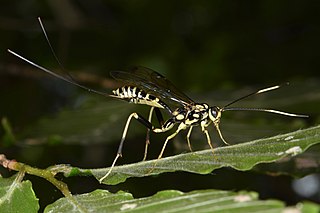
The Ichneumonidae, also known as ichneumon wasps, ichneumonid wasps, ichneumonids, or Darwin wasps, are a family of parasitoid wasps of the insect order Hymenoptera. They are one of the most diverse groups within the Hymenoptera with roughly 25,000 species described as of 2016. However, this likely represents less than a quarter of their true richness as reliable estimates are lacking, along with much of the most basic knowledge about their ecology, distribution, and evolution. It is estimated that there are more species in this family than there are species of birds and mammals combined. Ichneumonid wasps, with very few exceptions, attack the immature stages of holometabolous insects and spiders, eventually killing their hosts. They play an important role as regulators of insect populations, both in natural and semi-natural systems, making them promising agents for biological control.

Waxworms are the caterpillar larvae of wax moths, which belong to the family Pyralidae. Two closely related species are commercially bred – the lesser wax moth and the greater wax moth. They belong to the tribe Galleriini in the snout moth subfamily Galleriinae. Another species whose larvae share that name is the Indianmeal moth, though this species is not available commercially.

Megarhyssa, also known as giant ichneumonid wasps, giant ichneumons, or stump stabbers, is a genus of large ichneumon wasps, with some species known for having the longest ovipositors of any insects. They are idiobiont endoparasitoids of the larvae of wood-boring horntail wasps. The ovipositor can be mistaken for a large stinger. This is a genus of holometabolous insects within subfamily Rhyssinae that includes 37 species and belongs to Ichneumonidae, the family of wasps with the highest biodiversity in the world.

Banchinae is a subfamily of ichneumonid parasitoid wasps containing about 1,500 species; the genera Glypta and Lissonota are very large. The three tribes are all distributed worldwide.

Pimplinae are a worldwide subfamily of the parasitic wasp family Ichneumonidae.

Acaenitinae is a subfamily of the parasitoid wasp family Ichneumonidae. Female Acaenitinae have a large triangular projecting genital plate.

Tersilochinae is a worldwide subfamily of the parasitic wasp family Ichneumonidae.

Galleria mellonella, the greater wax moth or honeycomb moth, is a moth of the family Pyralidae. G. mellonella is found throughout the world. It is one of two species of wax moths, with the other being the lesser wax moth. G. mellonella eggs are laid in the spring, and they have four life stages. Males are able to generate ultrasonic sound pulses, which, along with pheromones, are used in mating. The larvae of G. mellonella are also often used as a model organism in research.

Heterorhabditis megidis is a species of nematodes in the genus Heterorhabditis. All species of this genus are obligate parasites of insects, and some are used as biological control agents for the control of pest insects.

Agrothereutes is a genus of parasitoid wasps belonging to the family Ichneumonidae. There are more than 40 described species in Agrothereutes.

Trogus is a genus of parasitoid wasp found in the Holarctic and Neotropic regions. It is placed in the subfamily Ichneumoninae and the tribe Ichneumonini. Trogus species are parasites of larvae and pupae of the swallowtail butterfly family, Papilionidae. The genus consists of twelve extant and one extinct species.

Orthocentrinae is a subfamily of ichneumon wasps in the family Ichneumonidae. There are at least 29 genera in Orthocentrinae.

Pimpla turionellae is a species of ichneumon wasp in the family Ichneumonidae. Its host is the larvae and pupae of Galleria mellonella
Alexeter is a genus of insect belonging to the family Ichneumonidae.

Apechthis is a genus of insects belonging to the family Ichneumonidae.

Arotes is a genus of parasitoid wasps belonging to the family Ichneumonidae.

Barycnemis is a genus of parasitoid wasps belonging to the family Ichneumonidae. Host species include the genera Byrrhus, Bledius, and Pissodes.
Campoletis is a genus of parasitoid wasps belonging to the family Ichneumonidae.
Diaparsis is a genus of parasitoid wasps belonging to the family Ichneumonidae.
Pimpla disparis is a species of Ichneumonidae wasp. It is a pupal parasitoid of Lymantria dispar, although it is a generalist parasitoid, attacking other species such as Thyridopteryx ephemeraeformis. It is native to the Palearctic realm, and has since the 1970s been introduced to the United States for biological pest control.















